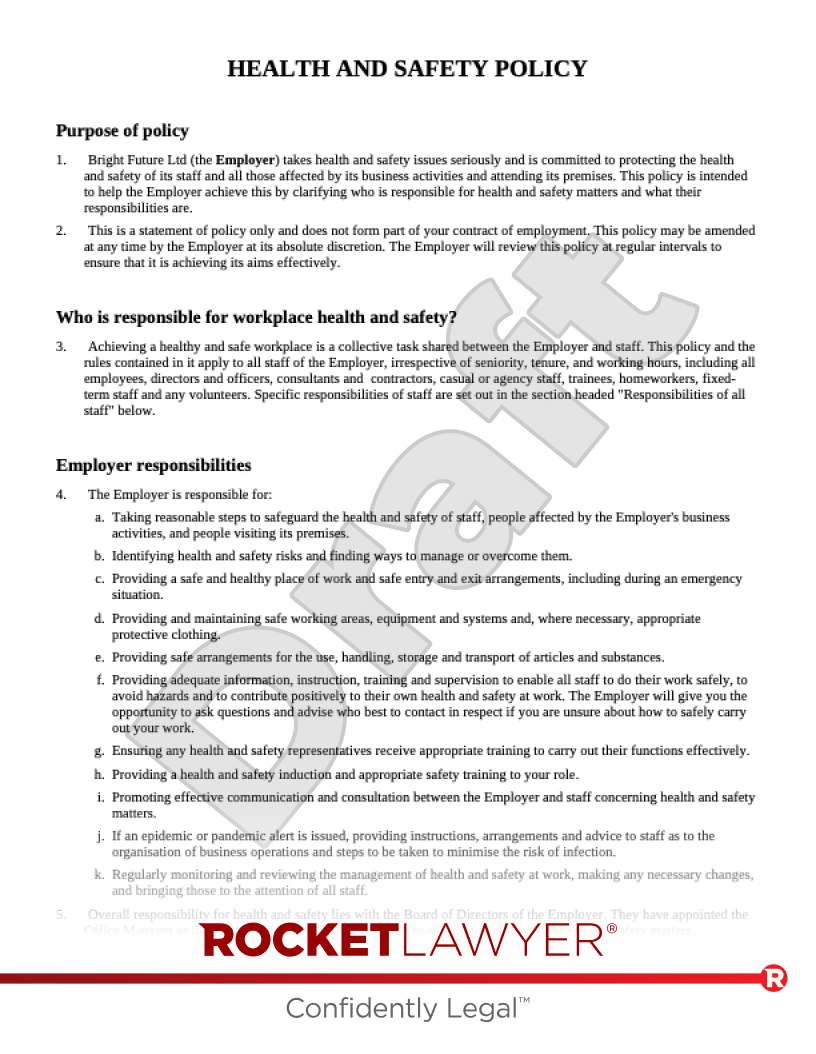What’s required by law?
If an employer has five or more employees, a written Health and safety policy is mandatory. This employment policy deals with a number of health and safety workplace issues, including accident reporting and what to do in case of a fire. The policy must set out the employer’s commitment to reduce risks and observe legal duties relevant to the workplace and its business. It will also set out what employees’ duties are in relation to health and safety and how they can meet these obligations.
The Data Protection Act 2018 (DPA), the main legislation implementing the General Data Protection Regulations (GDPR) in the UK, requires employers to comply with the principles for processing personal data, including being transparent and providing information to employees about personal data and how it is used. Employers can meet this obligation by:
-
providing an Employee privacy notice when an employee starts work
-
providing a Consultant privacy notice when engaging a consultant
-
having a Data protection and security policy in place
What other policies and procedures should employers have in place?
In addition to the legal requirement for certain employers to have a written health and safety policy, employers should consider adopting other key policies and procedures as a matter of good practice, depending on the size and the nature of the business.
The written statement of employment which employers must give their employees as a matter of law (generally as part of the Employment contract) should either contain or refer to disciplinary rules and procedures. Many employers will create a separate Disciplinary procedure to deal with these critical issues which should take account of the ACAS Code of Practice on Disciplinary and Grievance Procedures. Hand in hand with this often goes a Grievance procedure which helps to demonstrate your credentials as a fair employer.
An Equal opportunities policy should set out your commitment to equal opportunities in the workplace, including how any reasonable adjustments for disabilities will be made. A Recruitment policy sets out your recruitment process and commitment to equal opportunities when hiring new staff. Both must comply with the Equality Act 2010.
An Anti-harassment and bullying policy should set out your business’ approach towards workplace bullying and harassment. As employers can be liable for the actions of an employee where there is a case of workplace bullying and/or harassment, having this policy in place can help show that all ‘reasonable steps’ to prevent such behaviour have been taken.
A Whistleblowing policy sets out how workers and employees can make certain protected disclosures about their employer (eg about criminal offences or endangerment of health and safety). It explains how whistleblowers are protected from detriment when making any such disclosures.
Employers should consider having a Data protection and data security policy in place, to cover how confidential information is stored and its obligations under the DPA.
A Sickness policy helps you deal with sickness absence among your staff, including sickness reporting, prolonged absence and sick pay.
An Anti-bribery and corruption policy can help in demonstrating compliance with the Bribery Act 2010, while a Communications and use of equipment policy covers employee use of the internet and other company IT or communication devices.
Generally, employers will be liable for what their employees do on social media in connection with their employment. As a result, employers may wish to examine and make use of information from employees’ personal social media usage to make employment decisions. This, however, raises difficult issues of discrimination, privacy and data protection. Consider having a Social media policy that outlines the rules so that everyone in your business knows how to tackle this area.
Employers should consider creating an Annual leave policy to set out when employees can take holidays and the procedures for requesting annual leave. This policy should also outline other rights that employees have in relation to annual leave, for example, the right to carry over annual leave entitlement in some circumstances.
In terms of other kinds of leave entitlement, Maternity and Paternity policies are important. It's also worth considering putting in place a Parental leave policy, a Flexible working policy and a Working from home policy. Employers should also consider adopting a Bereavement leave policy to outline leave entitlements when staff experience a bereavement. Employers need to be aware of family leave rights staff are entitled to and have relevant policies in place, where they are applicable. For more information, read Family leave and rights.
When it comes to ending employment, employers can consider adopting a retirement policy and a Redundancy policy.
Other policies can be introduced in addition to the policies mentioned above. Employers must consider the specific needs of their business and, in particular, take account of any sector-specific requirements (eg dealing with hazardous substances).




